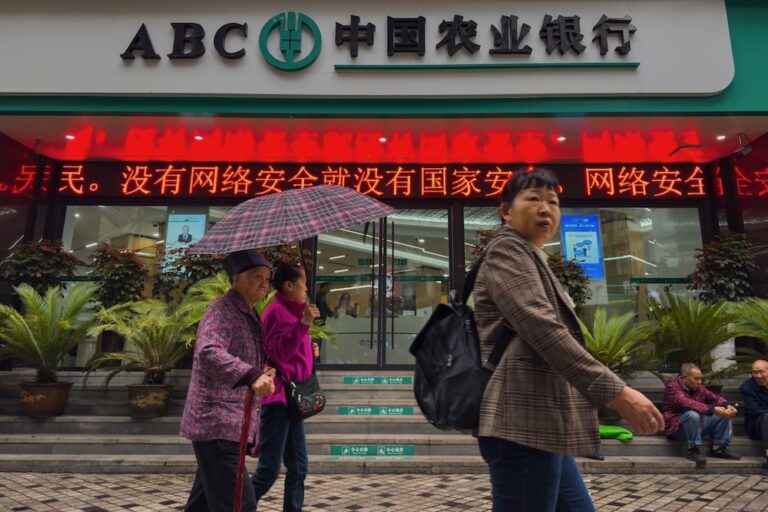"Prime Minister Gillard has spoken up about Australia's concerns from Canberra; now the test is whether she will do so publicly in Beijing," said Human Rights Watch.
(Human Rights Watch/IFEX) – New York, April 23, 2011 – Australia’s Prime Minister Julia Gillard should publicly raise key human rights concerns on her first official visit to China, Human Rights Watch said today. Gillard will visit China from April 25 to 28, 2011.
Prime Minister Gillard has expressed the Australian government’s concern on the recent spike in repression in China. The crackdown has involved the arrests and disappearances of dozens of the country’s most prominent lawyers, human rights defenders, and internet activists in recent weeks. On April 19, 2011, Gillard told Australian media that she did not want the Chinese government “taking backwards steps on human rights” and that she would “of course be raising human rights” in meetings with Chinese leaders. During talks in Canberra on April 7, 2011, with visiting senior Chinese government advisor Jia Qinglin, Gillard expressed concern about the recent crackdown and specifically raised the matter of detained of activist-artist Ai Weiwei.
“Prime Minister Gillard has spoken up about Australia’s concerns from Canberra; now the test is whether she will do so publicly in Beijing,” said Sophie Richardson, Asia advocacy director at Human Rights Watch. “The Chinese government is betting that Australia will swap silence on this current crackdown for the promise of improved bilateral trade ties. It’s up to Gillard to prove it wrong.”
Human Rights Watch said that since February 16, 2011, at least 39 lawyers, civil society activists, and bloggers have been criminally detained by state authorities while at least 18 others have been the victims of enforced disappearance. Between 100 and 200 other people have been subjected to an array of repressive measures ranging from police summonses to house arrest. The government has also tightened internet censorship, forced several liberal newspaper editors to step down, and imposed new restrictions on foreign media reporting in Beijing.
In a letter to Gillard, Human Rights Watch urges the Australian prime minister to publicly press for an end to four systemic ongoing human rights violations during her meetings with top leaders in China:
Enforced Disappearances
Enforced disappearances raise the risk of torture and ill-treatment of those targeted. Individuals who have been victims of enforced disappearances since mid-February 2011 include six of the country’s most prominent human rights lawyers: Teng Biao, Tang Jitian, Liu Shihui, Tang Jingling, Li Tiantian, and Jiang Tianyong. Jiang Tianyong was reportedly released on April 19, but the circumstances of his detention and his physical health have yet to emerge. Gao Zhisheng, a human rights lawyer, has been missing for most of the past two years and has given several detailed accounts of torture at the hands of the police.
Politically-Motivated Detentions and Arrests of Activists
Since mid-March, the Chinese government has detained or arrested numerous high profile activists including the artist Ai Weiwei, the disabled housing rights activist Ni Yulan, and prominent civil society advocates Ran Yunfei, Ding Mao, and Chen Wei. The allegations against these activists, which range from “economic crimes” and “creating a disturbance” to “inciting subversion of state power,” appear to be politically-motivated moves to stifle dissent.
Indefinite House Arrest
Liu Xia, the wife of imprisoned Nobel Peace laureate Liu Xiaobo has been under house arrest and has been progressively deprived of freedom to communicate with the outside world since the announcement of the prize in October 2010. Chen Guangcheng, a rural legal activist, has been imprisoned in his home since his release from prison in September 2010, and Zheng Enchong, a Shanghai-based human rights lawyer, has been under de facto house arrest since his release from prison in June 2006.
Restrictions on Foreign Correspondents
On February 27, 2011, plainclothes security forces launched unprovoked attacks on foreign correspondents who had gathered in the central Beijing shopping district of Wangfujing to cover a rumored anti-government protest. A video journalist was beaten and required medical treatment while more than a dozen other foreign media on the scene were manhandled, pushed, detained, and delayed by uniformed police and others. Since then, the Chinese government has tightened restrictions on foreign correspondents in violation of reporting freedom rules implemented in October 2008. The police and Ministry of Foreign Affairs have warned many correspondents that coverage of protests could result in the revocation of their visas. Police have informed some journalists that they now require special permits for reporting anywhere in central Beijing.
Human Rights Watch also urged Gillard to reinforce Australia’s commitment to international human rights standards by responding to a Chinese government query raised during Australia’s United Nations Universal Period Review (UPR) of its human rights record in January 2011, and by reiterating Australia’s recommendations to China made during its UPR in February 2009. The Chinese government asked the Australian government about “specific measures adopted to protect indigenous peoples, foreign immigrants and ethnic minorities from discrimination and against systemic racism in the media and internet.” During China’s UPR in February 2009, Australia urged that China abolish the death penalty, extend looser media regulations for foreign media to Chinese journalists, accept outstanding visit requests by United Nations’ special rapporteurs, and ratify the International Covenant on Civil and Political Rights “as quickly as possible.”
“Prime Minister Gillard should publicly express the international community’s dismay at the recent spike in repression in China since February,” said Richardson. “And by engaging the Chinese government on the specifics of that repression, she can set a needed example of leadership on international human rights norms and mechanisms.”
Click here to read the April 2011 Human Rights Watch letter to Prime Minister Gillard


